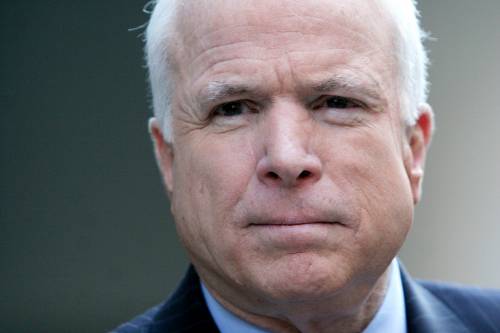GOP Lacks Leadership on Foreign Policy
In the post-9/11 era the GOP defined itself on national security and foreign policy.
Jul 31, 20201M Shares14.8M Views
Sen. John McCain (WDCpix)
During his first 45 days in office, President Obama has made several sharp departures from the foreign policies of the Bush administration that were shaped in the wake of the Sept. 11 attacks. Obama has announced a timetable for staggered withdrawal from Iraq. He has ordered 17,000 additional troops to Afghanistan and engaged in a wide-ranging review of U.S. war aims. And he has begun exploring direct negotiations with the Iranian government.
Illustration by: Matt Mahurin
And the response from the conservative movement and the Republican Party — which turned or sought to turn every election after 9/11 into a referendum on foreign policy and national security — has largely been either silence or agreement.
To some degree, conservatives say, the still-nascent Obama administration’s foreign policy needs time to develop before a critique can emerge. And when the administration enacts policies that the Republican party finds agreeable, as with the troop increase in Afghanistan, it would make little sense to attack. But that leads to a broader problem that leading conservatives identify: in the wake of the Bush administration, the question of what exactly Republican foreign policy is remains unsettled. Several GOP decisionmakers say bluntly that they are unsure who the leading foreign-policy figures on the right are anymore.
For the Republican Party, which has so long prided itself on its perceived dominance over questions of America’s role abroad, to be without clear foreign-policy leaders is a striking development. Preeminent among the GOP old-guard foreign-policy establishment is Sen. John McCain (R-Ariz.), who structured his 2008 presidential campaign around the argument that Obama was dangerously ignorant of geopolitics. Yet McCain gave a speechto the American Enterprise Institute on Feb. 25 that applauded Obama’s troop increase and urged a greater infusion of civilian resources, a direction that Obama administration officials have already indicated they’ll embrace when the new Afghanistan strategy is released next month. More surprisingly, after warning on the campaign trail that withdrawing from Iraq along a fixed timeline risked squandering the security gains made by the surge, McCain’s spokeswoman toldThe New York Times that the senator was “supportive of the plan.”
While significant portions of the conservative movement regard McCain as an apostate, he is perhaps the most prominent Republican to make any foreign policy speech at all since Obama’s election, indicating a leadership vacuum on the right over the issue. “You’ve got an interesting intellectual leveling now,” said Christian Brose, a policy advisor and chief speechwriter for former Secretary of State Condoleezza Rice who now edits and writes on Foreign Policy magazine’s “Shadow Government” blog, which seeks to provide a conservative critique of the administration’s foreign policy. “The folks who were in power and running things lost. Now you have a more level intellectual [playing] field, a less hierarchical environment that’s hungry for new thinking about policy and ready for an open debate on the question of first principles.”
To some in the neoconservative camp, that hunger indicates a defeat. “Right now the democratic forces have cratered,” said Mario Loyola, who in January left a staff position directing foreign policy for the Senate Republican Policy Committee. “The whole Bush, ‘we need democracy abroad to be safe at home’ [argument] has cratered among conservatives. So it’s the fall of the neocons on foreign policy, clearly.” Last month, Richard Perle, a former arms-control official in the Reagan administration and neoconservative eminence, gave a talk at the Nixon Centerdenying that he was a neoconservative or that there was any such thing as neoconservative foreign policy.
With Iraq, some on the right have explained the broader lack of criticism of Obama’s withdrawal strategy by considering the approach coterminous with Bush’s policies. “We think we won the argument — we won the war to defeat the insurgents,” Loyola continued. “The plan we had in 2005 worked: build up the Iraqi security forces, picture a long term alliance [with the Iraqis]” against an “Iranian enemy.” The opposition on the right was to a “congressionally mandated timetable,” he said, not to timetables for withdrawal themselves. Grover Norquist, the influential head of Americans for Tax Reform, said that aides to George W. Bush told him privately that a withdrawal strategy “was always their plan.”
In March 2007, however, then-Vice President Dick Cheney saida timeline would allow “the enemy to watch the clock and wait us out,” and that withdrawing from Iraq would reward terrorism. “If terrorists conclude attacks will change the behavior of a nation, they will attack the nation again and again,” he argued at a forum of the America Israel Public Affairs Committee. In July 2008, George W. Bush saidthat he continued to oppose “an artificial timetable for withdrawal” in an agreement on the U.S. troop presence with the Iraqi government and said the Obama campaign’s promise to withdraw from Iraq would amount to “giv[ing] up in the struggle against this enemy.” Months later, the Iraqi government forced the Bush administration to sign an accord that guaranteed a full troop withdrawal by December 2011.
On Afghanistan, there is an ideological struggle about what war strategy should be — but it’s confined to the left. A coalition of progressive activists called Get Afghanistan Right has argued against the buildup of U.S. troops, while an alternative progressive coalition convened by the National Security Network has supported it. Both are trying to influence the Obama administration’s strategy review. Yet most observers on the right who have spoken on the subject have tended to support the administration’s troop increase. At a Feb. 18 AEI forum on Afghanistan, neoconservative defense analysts Fred Kagan and Tom Donnelly blessed the administration’s troop decision while also urging the need for a concurrent increase from across the civilian agencies of the U.S. government, a point also made by Undersecretary of Defense for Policy Michele Flournoy during her confirmation hearing in January. Matt Duss, a research associate at the liberal Center for American Progress, observed“the far more vigorous debate over the future of the US intervention in Afghanistan — and about American national security in general — is now taking place on the left.”
Ideological positions on Afghanistan have yet to congeal on the right. Added Loyola, “There is not an ideological alignment,” saying that when it comes to crafting an effective strategy in Afghanistan, “the difficulty is overwhelming.” Brose believed that there nevertheless were certain baseline positions on Afghanistan that conservatives embraced. “The emerging consensus is, we need a counterinsurgency strategy, and the only way to pursue counterterrorism effectively is to protect the population, with a robust effort for assisting the [Afghan] government as it develops,” Brose said.
Norquist said that for the right, the greater and more immediate concern was the economy, as the Obama administration seeks a broad expansion of the government’s role, an idea anathema to conservatives. Foreign policy is “not an issue that moves attention and votes,” he said. “Right now you can light yourself on fire and give a foreign policy speech and Fox News will not cover you.”
Still, there is no shortage of conservative criticism of Obama on discrete security-related questions, as opposed to broader questions of foreign policy. Obama’s plan to close the Guantanamo Bay detention facility has aroused significant conservative objections. “The thought of sending these terrorists to the United States where they could possibly be released is a great mistake,” saidRep. Michael McCaul (R-Tex.), the ranking member on the Homeland Security Committee’s intelligence subcommittee, after visiting Guantanamo last month. Last month, Cheney allegedthat the Obama administration was “more concerned about reading the rights to an Al Qaeda terrorist than they are with protecting the United States.”
Loyola, who will soon head to Mexico to report on a piece for National Review, said that he hoped the GOP would reject what he called “Alamo Conservatives” who believe it necessary to fight the Obama administration on everything. But he said it would be necessary for an inter-movement struggle to take place in order to reestablish what it is the conservative movement and the Republican Party believes. “It’s not that we have no leaders, we have no consensus of ideas either,” he said. “The collapse of ideology and leadership on foreign policy on the Republican side is mesmerizing. There’s no consensus on anything.”
Some members of the old-guard neoconservative movement are attempting to reforge that consensus. National Journal reported in January that neoconservative luminaries like Weekly Standard publisher William Kristol, the Kagan brothers and a former spokesman for the U.S. occupation authority in Iraq, Dan Senor, were exploring the establishment of a new conservative foreign-policy think tank-cum-messaging institution. Calls to Senor’s office in New York were not returned.
Brose hopes his blog can step into the space vacated by the collapse of the Republican foreign-policy consensus. Its contributors are mostly veterans of the Bush administration at mid-tier positions, making them experienced enough to understand the challenges of governing but young enough to have been charged with implementing policy rather than making it. Brose said he wants to “pull in responsible people from the center-right to the right, who look at foreign policy from a reality-based perspective.” His writers are “more than willing to stand up and applaud when the Obama administration does good things, or lend support and cover on an issue by issue basis. But as the administration’s foreign policy starts to take shape more, we’ll also continue to engage in criticism and sketch out alternatives. We’ll call it as we see it.”
If that “reality-based” effort doesn’t succeed, he said, “then the right could end up in a pretty bad place.”

Paolo Reyna
Reviewer
Paolo Reyna is a writer and storyteller with a wide range of interests. He graduated from New York University with a Bachelor of Arts in Journalism and Media Studies.
Paolo enjoys writing about celebrity culture, gaming, visual arts, and events. He has a keen eye for trends in popular culture and an enthusiasm for exploring new ideas. Paolo's writing aims to inform and entertain while providing fresh perspectives on the topics that interest him most.
In his free time, he loves to travel, watch films, read books, and socialize with friends.
Latest Articles
Popular Articles

